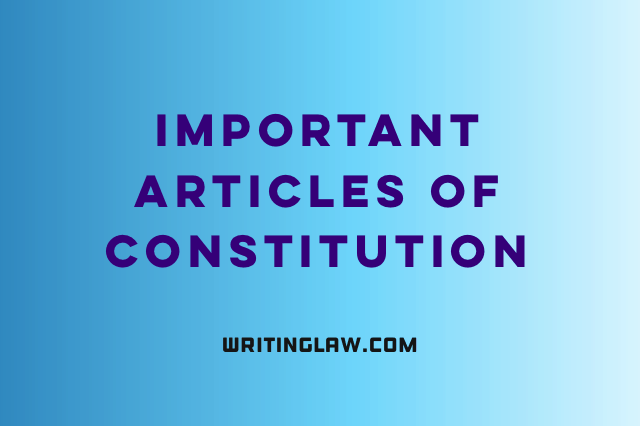
The Constitution of India is an essential subject for law students who are studying through their law degree or working hard to pass competitive legal exams. However, one look at the Indian Constitution PDF or its book, and you will find that it is a voluminous thing to cover. So to make it easier for your last-minute revision, here are the important Articles of the Indian Constitution.
Important Articles of the Indian Constitution
Article 2 – Admission or establishment of new States.
Article 3 – Formation of new States and alteration of areas, boundaries or names of existing States.
Article 5 – Citizenship at the commencement of the Constitution.
Article 10 – Continuance of the rights of citizenship.
Article 11 – Parliament to regulate the right of citizenship by law.
Article 12 – Definition. (Fundamental Rights)
Article 13 – Laws inconsistent with or in derogation of the fundamental rights.
Article 14 – Equality before law.
Article 15 – Prohibition of discrimination on grounds of religion, race, caste, sex or place of birth.
Article 16 – Equality of opportunity in matters of public employment.
Article 19 – Protection of certain rights regarding freedom of speech, etc.
Article 20 – Protection in respect of conviction for offences.
Article 21 – Protection of life and personal liberty.
Article 23 – Prohibition of traffic in human beings and forced labour.
Article 24 – Prohibition of employment of children in factories, etc.
Article 25 to 28 – Right to Freedom of Religion.
Article 32 – Remedies for enforcement of rights conferred by this Part.
Article 36 to 51 – Directive Principles of State Policy.
Article 51A – Fundamental duties.
Article 52 – The President of India.
Article 58 – Qualifications for election as President.
Article 61 – Procedure for impeachment of the President.
Article 73 – Extent of executive power of the Union.
Article 74 – Council of Ministers to aid and advise President.
Article 76 – Attorney-General for India.
Article 85 – Sessions of Parliament, prorogation and dissolution.
Article 101 – Vacation of seats.
Article 102 – Disqualifications for membership.
Article 105 – Powers, privileges, etc., of the Houses of Parliament and of the members and committees thereof.
Article 110 – Definition of ‘Money Bills’.
Article 117 – Special provisions as to financial Bills.
Article 123 – Power of President to promulgate Ordinances during recess of Parliament.
Article 124 – Establishment and constitution of Supreme Court.
Article 129 – Supreme Court to be a court of record.
Article 130 – Seat of Supreme Court.
Article 131 – Original jurisdiction of the Supreme Court.
Article 132 – Appellate jurisdiction of Supreme Court in appeals from High Courts in certain cases.
Article 133 – Appellate jurisdiction of Supreme Court in appeals from High Courts in regard to civil matters.
Article 134 – Appellate jurisdiction of Supreme Court in regard to criminal matters.
Article 134A – Certificate for appeal to the Supreme Court.
Article 135 – Jurisdiction and powers of the Federal Court under existing law to be exercisable by the Supreme Court.
Article 136 – Special leave to appeal by the Supreme Court.
Article 137 – Review of judgments or orders by the Supreme Court.
Article 138 – Enlargement of the jurisdiction of the Supreme Court.
Article 139 – Conferment on the Supreme Court of powers to issue certain writs.
Article 139A – Transfer of certain cases.
Article 140 – Ancillary powers of Supreme Court.
Article 141 – Law declared by Supreme Court to be binding on all courts.
Article 142 -Enforcement of decrees and orders of Supreme Court and orders as to discovery, etc.
Article 143 -Power of President to consult Supreme Court.
Article 148 – Comptroller and Auditor-General of India.
Article 213 – Power of Governor to promulgate Ordinances during recess of Legislature.
Article 215 – High Courts to be courts of record.
Article 226 – Power of High Courts to issue certain writs.
Article 227 – Power of superintendence over all courts by the High Court.
Article 245-255 – Legislative relations between the Union and the States.
Article 280 – Finance Commission.
Article 299 – Contracts.
Article 300 – Suits and proceedings.
Article 309 to 312
Article 320 – Functions of Public Service Commissions.
Article 323A – Administrative tribunals.
Article 326 – Elections to the House of the People and to the Legislative Assemblies of States to be on the basis of adult suffrage.
Article 352 to 360 – Emergency Provisions.
Article 368 – Power of Parliament to amend the Constitution and procedure therefor.
Constitution of India for Law Exams
So these were the most important Articles of the Constitution of India from the exam’s point of view. Before, you forget all other Articles and focus only on these, understand that other Articles may also be asked in exams and elsewhere. Do not be dependent only on the above-mentioned list. How much time and resources you devote to study are up to you. The list here is only to assist you to focus more on these and focus less on others. See how I said ‘focus less’ and not ‘ignore.’
- Article 334A of the Constitution of India - 14th April 2024
- Article 332A of the Constitution of India - 14th April 2024
- Article 330A of the Constitution of India - 14th April 2024







